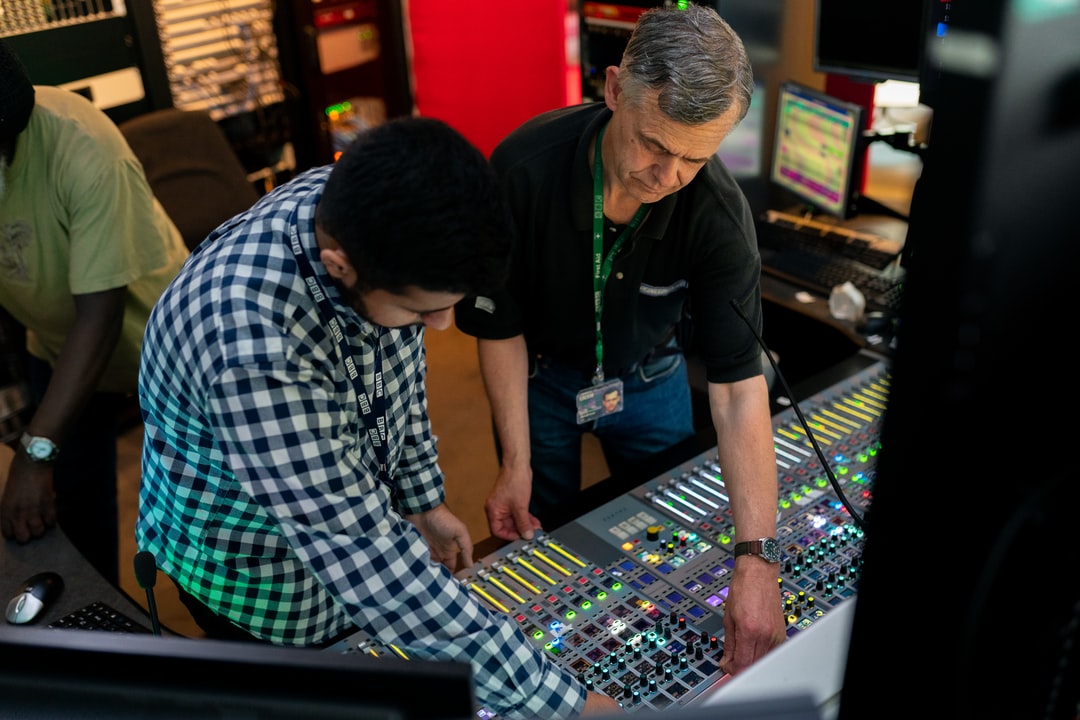Mixing vs. Mastering: The Differences Explained By Pros

*This article may contain links to affiliate products & services. We have reviewed these services to try and ensure the highest quality recommendations*
Written by Ramsey Brown.
No doubt about it, a musician’s trained ears know the difference between a song being mixed, mastered, or neither at all. Whether you know the definitions or not, almost anyone can distinguish between a song being recorded in a home studio and one that has been professionally recorded, mixed, and mastered.
If you are a musician, you know the importance of mixing and mastering your song in the production process. If you are a producer or engineer, you know that these steps can either make or break a track. If you are an artist who is just beginning your music career, you’ve probably heard of the two but may not know their differences or how they can help take your song to the next level.
Which is why we are going to explain exactly what mixing and mastering and how the different stages work for both of them in production. These two stages often cause confusion for musicians, especially for those who have less experience with track-based music composition programs. So, if you are a newbie to music production and have no clue about mixing and mastering music — fear not. After reading this article you will have a clear and concise understanding of the two and how exactly they work to make your music be the best sonically sounding as is it can possibly be!
What is Mixing?
Mixing is exactly what it sounds like — mixing the tracks and getting them to all fit together to make sure all the recorded instruments sound good cohesively. If you are wondering what exactly an individual track is, it’s simply the vocal tracks, the drum tracks, the piano tracks, the bass tracks, etc; it is all the tracks that make up the song. To further elaborate, say you have drums, bass, guitar and vocals recorded. Each of these would then be put onto an individual track in the Digital Audio Workstation or DAW, the computer software used for mixing and mastering.
Then, the mixing engineer edits the tracks, creates a stereo image through panning and sets the basic levels of each track — which is called a rough mix. The methods of creating a rough mix differ wildly. Some engineers start with EQ and compression on individual tracks and then move to instrument busses all the way up to the mix bus. All of this is done to make sure each element is audible as clearly as possible.
After effects are applied like reverb, delay, distortion, etc, the volume levels of individual tracks and instrument busses are automated to make the song more dynamic. Each song needs different automation, different compression, different effects.
Mixing is a very creative process that will help improve the overall feel of the song. When choosing a mixing engineer, it’s important to go with someone who shares your creative vision. It’s not enough for a mixing engineer to have the proper equipment or knowledge — a relationship between the artists and the engineer is also an important factor, so choose carefully for your project
Mixing is exactly what it sounds like — mixing the tracks and getting them to all fit together to make sure all the recorded instruments sound good cohesively. If you are wondering what exactly an individual track is, it’s simply the vocal tracks, the drum tracks, the piano tracks, the bass tracks, etc; it is all the tracks that make up the song. To further elaborate, say you have drums, bass, guitar and vocals recorded. Each of these would then be put onto an individual track in the Digital Audio Workstation or DAW, the computer software used for mixing and mastering.
Then, the mixing engineer edits the tracks, creates a stereo image through panning and sets the basic levels of each track — which is called a rough mix. The methods of creating a rough mix differ wildly. Some engineers start with EQ and compression on individual tracks and then move to instrument busses all the way up to the mix bus. All of this is done to make sure each element is audible as clearly as possible.
After effects are applied like reverb, delay, distortion, etc, the volume levels of individual tracks and instrument busses are automated to make the song more dynamic. Each song needs different automation, different compression, different effects.
Mixing is a very creative process that will help improve the overall feel of the song. When choosing a mixing engineer, it’s important to go with someone who shares your creative vision. It’s not enough for a mixing engineer to have the proper equipment or knowledge — a relationship between the artists and the engineer is also an important factor, so choose carefully for your project.
What is Mastering?
In mastering, the main focus is to apply very mild amounts of EQ and compression to a single stereo file of the finished mix. This is done to ensure that the song sounds as good as possible on any kind of headphone, laptop speaker or radio. Keep in mind that mixing is typically done on specifically designed studio monitor speakers which sound vastly different from your average speaker.
Mastering requires critical listening and complex software tools exist to facilitate the process. Results depend upon the intent of the engineer, the skills of the engineer, the accuracy of the speaker monitors, and the listening environment.
The final step is usually some sort of limiting or maximizing procedure to achieve maximum loudness of the track. Mastering is also very important when it comes to a coherent album sound. The above mentioned process is done to all tracks of an album to make sure that the levels and the sound quality don't vary too drastically.
There used to be a very exact line between mixing and mastering, but nowadays the lines are blurred more and more. Everybody is doing everything in the box and no one is keeping you from writing a track with compressors already on the tracks and a limiter on the mix bus. Though this is considered bad practice because you get an unrealistic perspective of how the song is going to sound.
We could say that mastering is the 'finishing and polishing' process of the music, because although the sound engineer does not have to mix everything to make it sound good, his or her job is to make that single track shine, improving it as much as they can to make it sound perfect before sending it for commercial distribution.
The job of the mastering editor seems simpler at first glance than that of the mixer, but the truth is that his work is just as important or even more important to achieve a successful end result of the production. While a mix editor works with multiple pre-recorded tracks at the same time, even up to 20 different tracks, the mastering engineer works with a single stereo track that must be improved in sound quality.
How are Mixing & Mastering Alike?
Mixing and mastering are done at different stages of the process but are still alike in many ways. This includes the following:
They use some of the same tools and techniques.
They use the same types of processing.
They are both done by sound engineers.
They both turn raw tracks into a great-sounding recording.
One more thing that’s good to know about both mixing and mastering engineers is that they are both incredibly important when it comes to the lifecycle of a particular song, even though some of the differences in their roles might seem like subtle differences to many people.
How are Mixing & Mastering Different?
Mixing is the creative part of the process, the editor has to choose the most appropriate way to put all the tracks he has together so that they sound right and convey what he wants musically.
Mastering on the other hand focuses on the final sound quality and is more of a engineered or scientific process rather than a creative one
During mixing, you will have access to all the instruments that are part of the final track, being able to add or remove what you don't like.
The duration of a mixing process can be enormous and last more than five days, while mastering can be done in less than 24 hours.
During mixing all kinds of adjustments are made that will affect a specific track and will not affect the final result that will later be edited and distributed, however in mastering every small change that is made affects the whole production.
Key Take Away Points
Once it is considered what both mixing and mastering engineers do in their day-to-day dealings with the music, it becomes much easier to learn the differences between the two roles. While both roles are equally important, they are quite different in a lot of ways.
Mixing engineers get to do fun things such as make certain instruments or vocals louder or lower. On the other hand, mastering engineers get access to the songs once the mixing task is complete. They only have access to the final product – much like a proofreader does when proofreading a completed document.
While mixing engineers tend to use numerous tools for their part of the process, mastering engineers tend to make very subtle changes, and sometimes very few changes when all is said and done. Instead of broad changes, mastering engineers usually only change the dynamics or the frequency balance of the song and little (or nothing) else.
In fact, there are occasions when the changes made by the mastering engineer are so subtle that the tracks will sound the same to the untrained ear. This is a good thing, however, because it means that the mixing engineers have done their job right!
It helps when mixing and mastering are considered two sides of the same coin. After the actual recording is done, there is still a lot of work to be done. Both the mixing engineer and the mastering engineer take over at this point.
Why You Should Hire a Professional Mixing & Mastering Engineer
Some upcoming musicians, producers, and DJs think that they can do their mix using some music mastering tips or recent audio mastering apps services. While these services are convenient and cheaper, online mixing and mastering services have their limitations.
When you want to go commercial, stay relevant and popular in the music industry, you definitely will need a professional mix and mastering touch on your tracks.
The kind of sound output that your tracks will need in order to be distributed in the music industry, sell well and be accepted by audio professionals is such that you can only get from a professional mastering engineer. Apart from getting a smooth, wrinkle free mix with unique characteristic pinned to your style of music from professional engineers, you stand to gain much more than what you pay.
Another reason to send your tracks to a professional engineer is because they will give you the professional sound you are looking for as well as prepare your song for radio promotion, CD distribution as well as music streaming sites such as Spotify, Apple Music, Soundcloud and many more.
When your song is ready to go, it's time to start promoting it to potential fans! Omari has the best organic promotion services money can buy. With packages for Spotify, TikTok, Instagram, and YouTube, we will get your music the traffic and attention it deserves! Click below for more information.
SPEAK YOUR MIND
How This INDIE Artist Got Over 67,598,275 Streams On ONE Song
Join the No-Nonsense Music Marketing Newsletter to get the most valuable weekly case studies and strategies to grow your music business!




